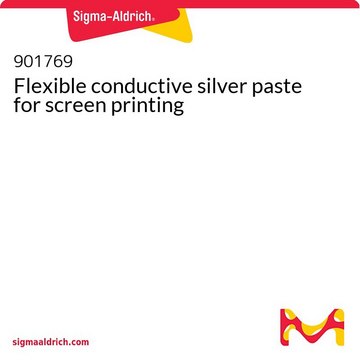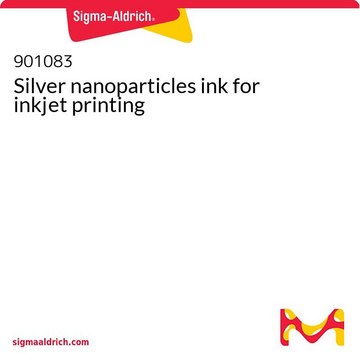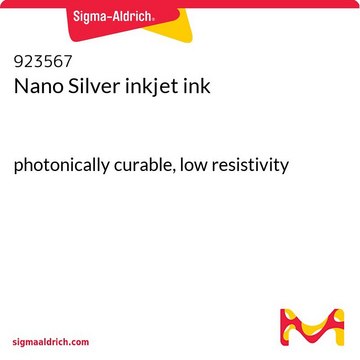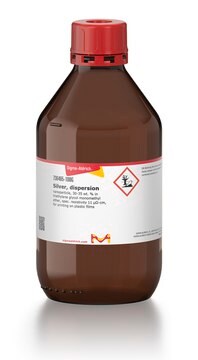907669
Silver ink
75 wt%, LIFT printable
Synonyme(s) :
Ag ink, Laser induced forward transfer
About This Item
Produits recommandés
Description
Silver content : 75 wt%
Solvent : Diethylene Glycol Mono Butyl Ether (DGBE)
Surface Tension : 28 dyn/cm (Pendant Drop)
Forme
paste
Taille des particules
50-70 nm (by Lumisizer™)
90-120 nm (by Lumisizer™)
Viscosité
50,000-100,000 cP (Shear Rate: 1 s-1
250cP - 450 cP (Shear Rate: 1000 s-1))
Densité
2.85-3.3
Température de stockage
15-25°C
Application
The ink offers:
- Uniform and reproducible donor layer with low drying speed
- Stable accurate jetting in different types of laser systems, wide working window of jetting parameters
- High speed printing (20-50kHz), allowing high throughput
- Narrow patterning on plastic and glass substrates (line width ∼50 μm, height ∼0.5 μm, spacing ∼50 μm)
- Laser sintering of LIFT printed pattern, providing good electrical properties
Fit for:
LIFT digital printing
Additive electronic manufacturing
Printed electronics: RFID, FPD, Sensors
Laser induced forward transfer printing (LIFT) is a non-contact, nozzle-free, one step, direct laser writing process.
LIFT can operate under atmospheric conditions, is compatible with low laser fluences, allows the printing of organic and inorganic materials as well as biological elements. The printing process can take place from both liquid and solid phases. It further has a high lateral resolution only defined by the laser spot size. It is a method compatible with inorganic semiconductor sensor fabrication, OLED fabrication and bio printing.
Autres remarques
*Parameters should be optimized depending on line geometry and substrate
Stockage et stabilité
Informations légales
Mention d'avertissement
Warning
Mentions de danger
Conseils de prudence
Classification des risques
Aquatic Acute 1 - Aquatic Chronic 1 - Eye Irrit. 2
Code de la classe de stockage
10 - Combustible liquids
Classe de danger pour l'eau (WGK)
WGK 3
Point d'éclair (°F)
Not applicable
Point d'éclair (°C)
Not applicable
Faites votre choix parmi les versions les plus récentes :
Certificats d'analyse (COA)
Vous ne trouvez pas la bonne version ?
Si vous avez besoin d'une version particulière, vous pouvez rechercher un certificat spécifique par le numéro de lot.
Déjà en possession de ce produit ?
Retrouvez la documentation relative aux produits que vous avez récemment achetés dans la Bibliothèque de documents.
Les clients ont également consulté
Articles
Professor Tokito and Professor Takeda share their new materials, device architecture design principles, and performance optimization protocols for printed and solution-processed, low-cost, highly flexible, organic electronic devices.
Notre équipe de scientifiques dispose d'une expérience dans tous les secteurs de la recherche, notamment en sciences de la vie, science des matériaux, synthèse chimique, chromatographie, analyse et dans de nombreux autres domaines..
Contacter notre Service technique










